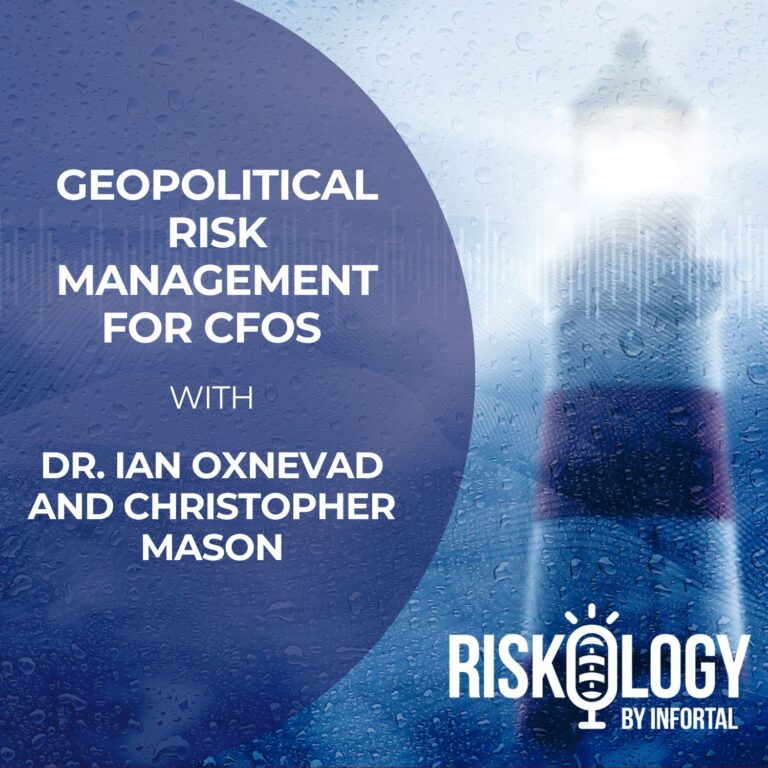The Evolving Role of CFOs in Geopolitical Risk Management
CFOs, it’s time to rethink how you approach global risk!
Geopolitics isn’t just for diplomats – it’s seeping into the boardroom and impacting bottom lines, now more than ever.
Join Riskology by Infortal™ hosts Dr. Ian Oxnevad and Christopher Mason from Infortal Worldwide as they highlight the strategic importance of factoring in Geopolitical Risk analysis into CFO-led strategic planning and financial forecasting.
Geopolitical Risk & Chief Financial Officers (CFOs)
In the complex landscape of global business, geopolitical risks hold significant sway over corporate strategy, whether planned or not. Geopolitical risks encompass a wide range of factors, from inflation and economic policies to socio-political dynamics, all of which can disrupt market stability.
Traditionally, the evaluation and management of these risks may not have fallen directly within the purview of CFOs. However, as companies increasingly navigate volatile environments, CFOs find themselves uniquely positioned to incorporate geopolitical risk assessments into financial strategies to ensure longer-term sustainability.
CFOs are integral to a firm’s financial health and resilience. As global markets become more interconnected and unpredictable, CFOs must now factor in geopolitical variables that could significantly impact an organization’s operational continuity. Just think about the recent impact that economic warfare, i.e. sanctions, has had on the shipping industry.
Understanding these dynamics is essential for fostering robust financial planning and risk management.
The Impact of Geopolitical Risks on Financial Planning
Geopolitical instability can have far-reaching impacts on various financial aspects of a business, making it critical for CFOs to stay informed and proactive. The key to thriving amidst these uncertainties lies in strategic preparedness and robust scenario planning.
Scenario planning involves envisioning multiple future states and their potential impacts on the business.
By simulating different geopolitical scenarios, CFOs can proactively devise contingency measures to mitigate risks. For instance, understanding how a new trade embargo might affect supply chains allows financial leaders to identify cost-effective alternative suppliers or logistical routes, thereby minimizing disruption and preserving continuity in the event of a significant geopolitical shift.
This financial foresight also aids in maintaining compliance with international laws and regulations, safeguarding the firm from legal repercussions.
Leveraging Technology for Risk Monitoring
The evolution of technology has dramatically enhanced the capacity to monitor and mitigate geopolitical risks. Advanced risk dashboards and sophisticated risk management tools now offer unprecedented capabilities in risk detection and analysis.
Risk management systems can categorize risks, assign scores, and generate predictive analytics, giving CFOs actionable insights. This continuous monitoring is crucial, as it allows for timely adjustments to financial plans, ensuring that resources are allocated efficiently, and emergency funds are available when crisis strikes.
Importantly, you also need to make sure that you are looking beyond the tech solutions to make sure that you have a boots-on-the-ground understanding of the risk landscape. This may require periodic reviews or conducting more in-depth due diligence.
Differentiating Risks from Threats
A clear distinction between risks and threats is essential for effective financial planning.
It is important to proactively manage risks to avoid an mitigate threats. This requires conducting the right level of risk mitigation planning and conducting deep level due diligence when reviewing business partners, customers, suppliers and market areas.
The better you understand the risk profile of a scenario the more prepared you will be to head off emerging threats.
You need to monitor and manage the right risks according to your firm’s risk tolerance level before they escalate into threats. Once a threat emerges, such as geopolitical instability, a company may face significant cost increases.
Having a contingency plan in place can save your financial outlook.
Developing Comprehensive Contingency Plans
Contingency planning is a critical component of effective risk management, especially in the face of unpredictable geopolitical threats. These plans involve outlining specific steps and resources necessary to address various risk scenarios, from economic sanctions to political upheaval.
Undertaking contingency planning requires a deep analysis of potential risks and their financial implications. CFOs must work collaboratively with other stakeholders, including risk management teams, operational managers, and external consultants, to develop comprehensive strategies.
Specific actions might include setting aside financial reserves, diversifying investments, or establishing alternative operational sites. By establishing these plans ahead of time, organizations can react more swiftly and effectively, preserving financial stability.
Integration of Intelligence and Risk Officers
To efficiently navigate the complexities of geopolitical risks, integrating dedicated risk intelligence officers or even entire geopolitical risk management teams into the organizational structure is becoming more common. However, American companies still have a long way to go.
Establishing robust risk management frameworks that include regular intelligence updates and compliance checks can ensure that companies are not caught off-guard by emerging threats.
Leveraging CFOs’ Financial Acumen in Risk Scenarios
The unique position of CFOs allows them to understand and manage the financial ramifications of different risk scenarios comprehensively. This understanding is crucial not only for preparing for risks but also for managing them once they translate into threats.
By maintaining a proactive stance on risk management, CFOs can ensure their organizations remain resilient in the face of geopolitical uncertainty.
Resources:
Dr. Ian Oxnevad on LinkedIn
Chris Mason on LinkedIn



